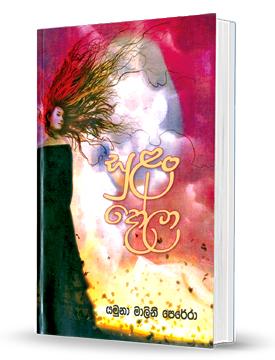
Yamuna Malini Perera’s latest Sinhala novel Sulang Dola is a successful attempt to survey real life experiences or adventures or misadventures of married life. It seems that there is a shade of a resemblance between the style of presenting her novel and the design of Geoffrey Chaucer’s The Canterbury Tales.
I thought of pointing out this feature since it is seldom seen in Sinhala novels. In weaving The Canterbury Tales, Chaucer gives in advance resume of the characters of his novel in the Prologue.
Thereafter, he goes on describing the characters individually and elaborately. Though not on a grand scale like Chaucer’s, Yamuna presents her characters in the course of her novel and ties the strand of her story with a short summary of each accessory anecdote.
The first 49 pages of Yamuna’s novel are the best and charming. That portion so strongly appeals to me that as I began to read it, my memory went back about four decades to early sixties. One day, when I visited a cousin brother of mine, I stayed the night there. After dinner, I came upon a copy of Madawala S. Ratnayake’s Akkara Paha, a popular novel those days. At a stretch from 8 p.m. to 4 a.m. on the following day, I kept on reading it.
Appealing
The opening lines of Yamuna’s novel are so appealing that you feel as if you are in that rural background, moving with unassuming people, very kind and honest and natural in their behaviour, quite a contrast to the present-day showy sycophants.
Kumari Sandaseeli, the main character, born of parents of a low income bracket in the countryside is very bright in her studies.
She is the only student who passes the GCE Advanced Level examination with colours and seeks admission to the university. This is a kind of miracle to a girl in an utterly rural atmosphere. She gets entangled with several boys. Hers is a vegetable love.
Later on, however, she gets married to a well-to-do and educated man. And they lead a life full of love, lust and luxury forgetting the whole world, even her loving parents and the only brother who sacrificed their comforts for her well-being!
Married life
As time passed, after about five years of enjoyable married life, there began to appear forebodings of her husband’s untoward conduct. While she played the role of faithful wife, her husband was a flirt. With deceitfully loving words, he was coaxing and cunning enough to deceive her.
After getting to know about her husband’s adulterous advances, she somehow or other put up with despair and humiliation.
In this pathetic situation, she sought to find a little relief by reading reports of errant husbands of her friends who were also indulging in adultery. She, however, shows her feminine nature of forgiveness towards her husband when his brother is about to take him away to a house where disabled people were looked after. Disallowing that move, she says she would take care of him.
Here, the emotions of love, fidelity and possessiveness overpower her frustration. This climax reminds me of the high point of D.H. Lawrence’s short story “Odour of Chrysanthemums” where Morel’s mother and wife both are filled with possessive feelings. Both of them want to possess his dead body.
Women’s rights
The novel also discloses Yamuna’s role as a fighter for women’s rights, for equal status for women. She evokes effectively in the reader a feeling of disgust on the unfaithful trait in men for adultery which is rampant in the commercialized society today. It, therefore, tends to prove that wealth is not a bliss, but a bane.
Unlike in her earlier works, Yamuna employs the device of soliloquies in order to get the characters to come out with their individual views spurred by their conscience.
All those characters are women who suffer meekly from the ingratitude and infidelity of their husbands except one, that is, Kumari’s driver who is a victim of his wayward wife! This fact shows that passion is common to men and women alike. This human problem brings to my mind the famous saying, “To err is human, to forgive divine.”
Thus, Kumari’s noble heart pardons Piyal ultimately.
- Somapala Arandara
